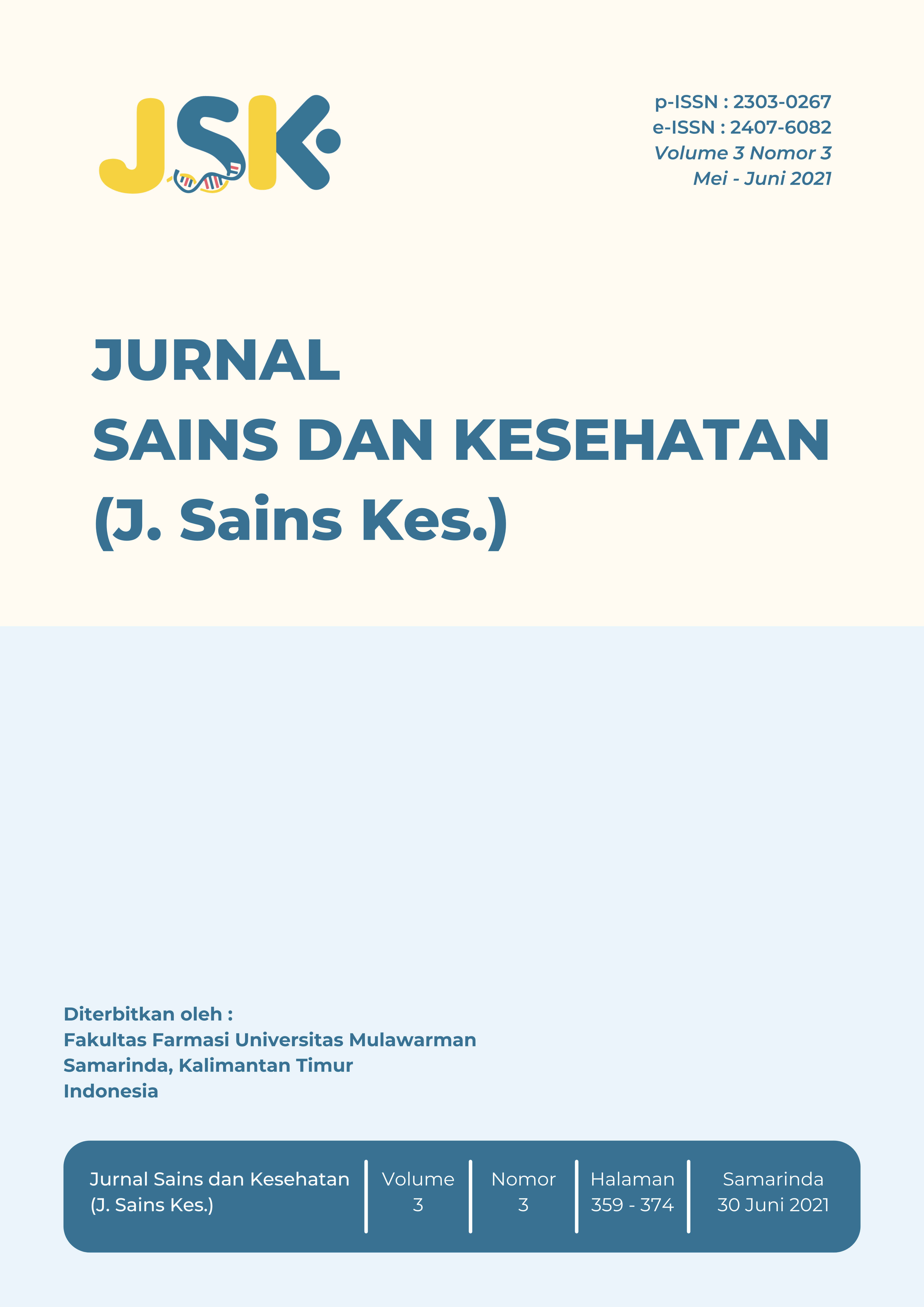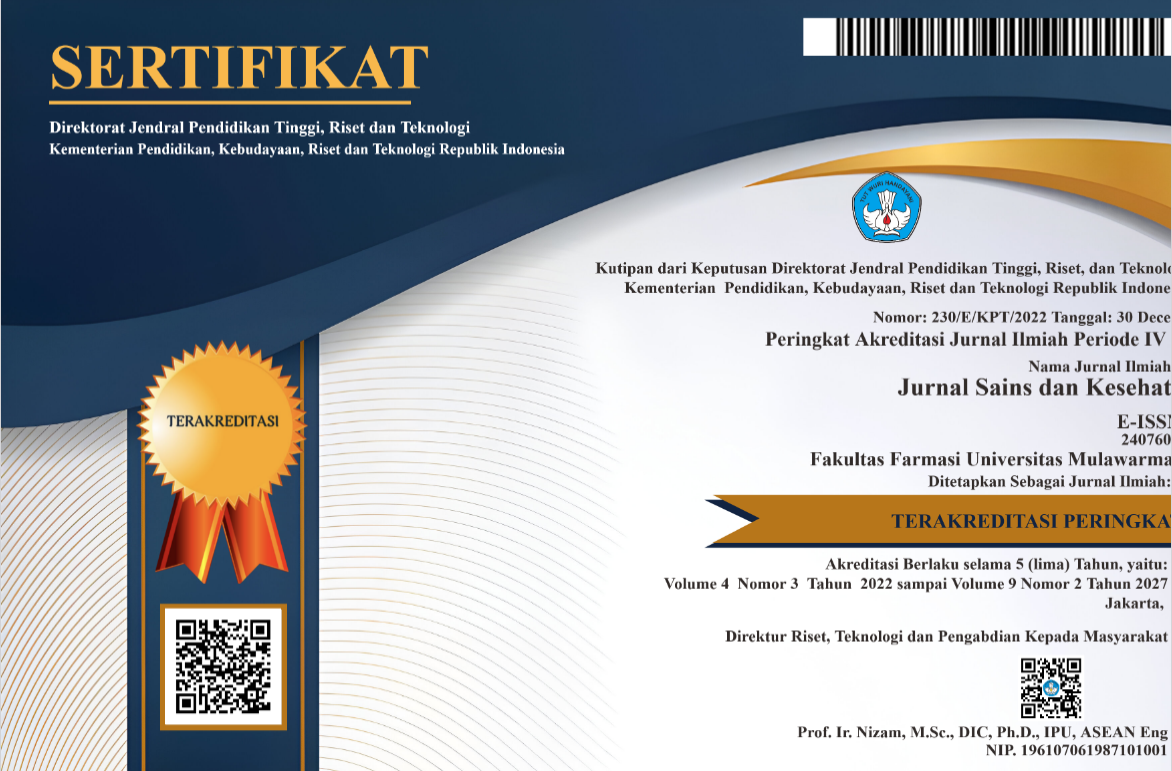Pengaruh SSRIs Untuk Meningkatkan Independensi Fungsional Pada Pasien Depresi Pasca Stroke
Effect of SSRIs to Improve Functional Independence in Post-Stroke Depression Patients
Keywords:
SSRI, Depresi Pasca-stroke, Independensi FungsionalAbstract
References
Towfighi A, Ovbiagele B, El Husseini N, Hackett ML, Jorge RE, Kissela BM, et al. Poststroke Depression: A Scientific Statement for Healthcare Professionals from the American Heart Association/American Stroke Association. Stroke. 2017;48(2):e30–43.
Castilla-Guerra L, Fernandez Moreno M del C, Esparrago-Llorca G, Colmenero-Camacho MA. Pharmacological management of post-stroke depression. Expert Rev Neurother [Internet]. 2020;20(2):157–66. Available from: https://doi.org/10.1080/14737175.2020.1707666
Espárrago Llorca G, Castilla-Guerra L, Fernández Moreno MC, Ruiz Doblado S, Jiménez Hernández MD. Depresión post ictus: Una actualización. Neurologia [Internet]. 2015;30(1):23–31. Available from: http://dx.doi.org/10.1016/j.nrl.2012.06.008
Berg A, Palomäki H, Lehtihalmes M, Lönnqvist J, Kaste M. Poststroke depression in acute phase after stroke. Cerebrovasc Dis. 2001;12(1):14–20.
Vika WN, Syarifah AS, Ratnawati M. Hubungan Status Fungsional Dengan Tingkat Depresi Pada Pasien Stroke Di Ruang Flamboyan Rsud Jombang. J Ilm Kebidanan (Scientific J Midwifery). 2018;4(1):52–9.
Khomsiatun. Hubungan status fungsional terhadap depresi pada pasien stroke di ruang fisioterapi di rsud wilayah kabupaten semarang. 2015;
Feng C, Fang M, Liu XY. The neurobiological pathogenesis of poststroke depression. Sci World J. 2014;2014.
Guajardo VD, Terroni L, Sobreiro MDFM, Zerbini MIDS, Tinone G, Scaff M, et al. The influence of depressive symptoms on quality of life after stroke: A prospective study. J Stroke Cerebrovasc Dis. 2015;24(1):201–9.
Cai W, Mueller C, Li YJ, Shen WD, Stewart R. Post stroke depression and risk of stroke recurrence and mortality: A systematic review and meta-analysis. Ageing Res Rev [Internet]. 2019;50:102–9. Available from: https://doi.org/10.1016/j.arr.2019.01.013
Dar et al. Post Stroke Depression Frequently Overlooked, Undiagnosed, Untreated. Neuropsychiatry (London). 2017;07(06):906–19.
Stokes&Hasan. Depression after stroke: A review of the evidence base to inform the development of an integrated care pathway. Part 2: Treatment alternatives. Clin Rehabil. 2002;16(3):248–60.
Gruenbaum BF, Kutz R, Zlotnik A. Blood glutamate scavenging sebagai pendekatan terapi berbasis glutamat baru untuk depresi pasca-stroke. 2020;0:1–14.
Chollet F, Tardy J, Albucher JF, Thalamas C, Berard E, Lamy C, et al. Fluoxetine for motor recovery after acute ischaemic stroke (FLAME): A randomised placebo-controlled trial. Lancet Neurol [Internet]. 2011;10(2):123–30. Available from: http://dx.doi.org/10.1016/S1474-4422(10)70314-8
Savadi Oskouie D, Sharifipour E, Sadeghi Bazargani H, Hashemilar M, Nikanfar M, Ghazanfari Amlashi S, et al. Efficacy of Citalopram on Acute Ischemic Stroke Outcome: A Randomized Clinical Trial. Neurorehabil Neural Repair. 2017;31(7):638–47.
Gu SC, Wang C De. Early Selective Serotonin Reuptake Inhibitors for Recovery after Stroke: A Meta-Analysis and Trial Sequential Analysis. J Stroke Cerebrovasc Dis [Internet]. 2018;27(5):1178–89. Available from: https://doi.org/10.1016/j.jstrokecerebrovasdis.2017.11.031
Kraglund KL, Mortensen JK, Grove EL, Johnsen SP, Andersen G. TALOS: A multicenter, randomized, double-blind, placebo-controlled trial to test the effects of citalopram in patients with acute stroke. Int J Stroke. 2015;10(6):985–7.
Hong W, Zhao Z, Wang D, Li M, Tang C, Li Z, et al. Altered gray matter volumes in post-stroke depressive patients after subcortical stroke. NeuroImage Clin [Internet]. 2020;26(September 2019):102224. Available from: https://doi.org/10.1016/j.nicl.2020.102224
Chemerinski et al. Improved recovery in activities of daily living associated with remission of poststroke depression. Stroke. 2001;32(1):113–7.
Zhou S, Liu S, Liu X, Zhuang W. Selective serotonin reuptake inhibitors for functional independence and depression prevention in early stage of post-stroke: A meta-analysis. Med (United States). 2020;99(6):1–8.
Kwon CY, Lee B, Chung SY, Kim JW, Shin A, Choi Y yong, et al. Efficacy and safety of Sihogayonggolmoryeo-tang (Saikokaryukotsuboreito, Chai-Hu-Jia-Long-Gu-Mu-Li-Tang) for post-stroke depression: A systematic review and meta-analysis. Sci Rep. 2019;9(1):1–20.
Mikami K, Jorge RE, Adams HP, Davis PH, Leira EC, Jang M, et al. Effect of antidepressants on the course of disability following stroke. Am J Geriatr Psychiatry [Internet]. 2011;19(12):1007–15. Available from: http://dx.doi.org/10.1097/JGP.0b013e31821181b0
Schmidt HD, Duman RS. The role of neurotrophic factors in adult hippocampal neurogenesis, antidepressant treatments and animal models of depressive-like behavior. Behav Pharmacol. 2007;18(5–6):391–418.
Imran et al. Efektifitas New Bobath Concept Terhadap Peningkatan Fungsional Pasien Stroke Iskemik dengan Outcome Stroke Diukur Menggunakan Fungsional Independent Measurement ( Fim ) dan Glasgow Outcome Scale ( GOS ) Di RSUDZA 2018. J Med Sci. 2020;1(1):14–20.
Kim et al. Efficacy of early administration of escitalopram on depressive and emotional symptoms and neurological dysfunction after stroke: a multicentre, double-blind, randomised, placebo-controlled study. The Lancet Psychiatry [Internet]. 2017;4(1):33–41. Available from: http://dx.doi.org/10.1016/S2215-0366(16)30417-5
Robinson et al. Clinical Neuropsychiatry of Stroke. 2006;
Gao J, Lin M, Zhao J, Bi S, Ni Z, Shang X. Different interventions for post-ischaemic stroke depression in different time periods: A single-blind randomized controlled trial with stratification by time after stroke. Clin Rehabil. 2017;31(1):71–81.
Lanctôt KL, Lindsay MP, Smith EE, Sahlas DJ, Foley N, Gubitz G, et al. Canadian Stroke Best Practice Recommendations: Mood, Cognition and Fatigue following Stroke, 6th edition update 2019. Int J Stroke. 2019;0(0):1–21.
Man S, Hung BHB, Ng RMK, Yu X, Cheung H, Fung MPM, et al. A pilot controlled trial of a combination of dense cranial electroacupuncture stimulation and body acupuncture for post-stroke depression. 2014;1–8.
Razazian N, Esmaeili O, Almasi A. Effect of Fluoxetine on Motor Improvement in Ischemic Stroke Patients: A Double Blind Clinical Trial Study. Zahedan J Res Med Sci. 2016;18(7).
Miyai I, Reding MJ. Effects of Antidepressants on Functional Recovery Following Stroke: A Double-Blind Study. Neurorehabil Neural Repair. 1998;12(1):5–13.
Gonzalez-Torrecillas JL, Mendlewicz J, Lobo A. Effects of Early Treatment of Poststroke Depression on Neuropsychological Rehabilitation. Int Psychogeriatrics. 1995;7(4):547–60.
Gainotti G, Antonucci G, Marra C, Paolucci S. Relation between depression after stroke, antidepressant therapy, and functional recovery. J Neurol Neurosurg Psychiatry. 2001;71(2):258–61.
Loubinoux I, Pariente J, Boulanouar K, Carel C, Manelfe C, Rascol O, et al. A single dose of the serotonin neurotransmission agonist paroxetine enhances motor output: Double-blind, placebo-controlled, fMRI study in healthy subjects. Neuroimage. 2002;15(1):26–36.
Pariente J, Loubinoux I, Carel C, Albucher JF, Leger A, Manelfe C, et al. Fluoxetine modulates motor performance and cerebral activation of patients recovering from stroke. Ann Neurol. 2001;50(6):718–29.
Stamenkovic et al. Poststroke Depression and Fluoxetine. 1996;(March):446–7.
Zhaosheng D, Fang Z, Maming LIN, Yun W. Effect of Fluoxetine on Expression of Brain- derived Neurotrophic Factor in Patients with Post-stroke Depression. 2014;2(4):467–71.
Downloads
Published
Issue
Section
Deprecated: json_decode(): Passing null to parameter #1 ($json) of type string is deprecated in /home/jskff/public_html/plugins/generic/citations/CitationsPlugin.php on line 68
How to Cite
Most read articles by the same author(s)
- Doni Suryadi, Vera Madonna Lumban Toruan, Fransiska Anggreni Sihotang, Loly Rotua Dharmanita Siagian, Hubungan Jenis Plasmodium falciparum dan Plasmodium vivax dengan Kejadian Anemia pada Pasien Malaria di RSUD Ratu Aji Putri Botung Penajam Paser Utara , Jurnal Sains dan Kesehatan: Vol. 3 No. 2 (2021): J. Sains Kes.
- Fadillah Hana Hafifah, Nur Khoma Fatmawati, Fransiska Anggreni Sihotang, Siti Khotimah, Hubungan Lama Penggunaan Amlodipine dengan Derajat Keluhan Mata Kering pada Pasien Hipertensi , Jurnal Sains dan Kesehatan: Vol. 3 No. 4 (2021): J. Sains Kes.
Similar Articles
- Raden Retno Ariani, Lia Amalia, Suryani Gunadharma, Kusnandar Anggadiredja, Studi Efikasi dan Pemantauan Reaksi Obat Merugikan dari Antiplatelet pada Pasien Pasca Stroke Iskemik di RSUP dr. Hasan Sadikin Bandung , Jurnal Sains dan Kesehatan: Vol. 5 No. 5 (2023): J. Sains Kes.
- Rohmi Pawitra Sari, Denny Jeffry Rotinsulu, Evi Fitriany, Hubungan Indeks Massa Tubuh dan Lingkar Pinggang dengan Kualitas Tidur Mahasiswa Preklinik Program Studi Kedokteran, Fakultas Kedokteran Universitas Mulawarman , Jurnal Sains dan Kesehatan: Vol. 3 No. 3 (2021): J. Sains Kes.
- Annisah Nurdwita Ashari, Yuniati Yuniati, Ignatia Sinta Murti, Hubungan Pola Makan dengan Kejadian Dispepsia Fungsional pada Mahasiswa Fakultas Kedokteran Universitas Mulawarman , Jurnal Sains dan Kesehatan: Vol. 4 No. 2 (2022): J. Sains Kes.
- Sulistiawati Sulistiawati, Nilna Nur Faizah, Eka Yuni Nugrahayu, Jaya Mualimin, Arie Ibrahim, Gambaran Gejala Depresi pada Mahasiswa Fakultas Kedokteran Universitas Mulawarman , Jurnal Sains dan Kesehatan: Vol. 3 No. 5 (2021): J. Sains Kes.
- Joses Michael Korin, Eka Yuni Nugrahayu, Nirapambudi Devianto, Hubungan Lama Menjalani Hemodialisis dengan Tingkat Depresi pada Pasien Hemodialisis di RSUD Abdul Wahab Sjahranie Samarinda , Jurnal Sains dan Kesehatan: Vol. 2 No. 4 (2020): J. Sains Kes.
- Haifah Maulida, Atika Jatimi, Maulidiyah Junnatul Azizah Heru, Zainal Munir, Handono Fatkhur Rahman, Depresi pada Komunitas dalam Menghadapi Pandemi COVID-19: A Systematic Review , Jurnal Sains dan Kesehatan: Vol. 2 No. 4 (2020): J. Sains Kes.
- Berta Ramadhani Ishaq, Arie Ibrahim, Abdillah Iskandar, Hubungan antara Ukuran Massa dan Derajat Tumor dengan Glasgow Coma Scale Pra dan Pasca Tumor Reseksi Bedah Meningioma dan Karnorfsky Performance Scale Pasca Tumor Reseksi Bedah Meningioma di RSUD Abdul Wahab Sjahranie Samarinda Januari 2018 – Maret 2020 , Jurnal Sains dan Kesehatan: Vol. 3 No. 4 (2021): J. Sains Kes.
- Dini Anggraini, M. Khairul Nuryanto, Eka Yuni Nugrahayu, Hubungan Antara Internet Addiction dengan Depresi pada Siswa SMA Negeri 3 Samarinda Pengguna Smartphone , Jurnal Sains dan Kesehatan: Vol. 3 No. 4 (2021): J. Sains Kes.
- Imam Fathur Rozi, Gregorius Tekwan, Hary Nugroho, Hubungan Usia Pasien, Jenis Fraktur dan Lokasi Fraktur Tulang Panjang Terhadap Lama Rawat Inap Pasca Bedah di RS Ortopedi Prof. Dr. R. Soeharso Surakarta , Jurnal Sains dan Kesehatan: Vol. 3 No. 5 (2021): J. Sains Kes.
- Mirfaidah Nadjamuddin, Marianti A Manggau, Cahyono Kaelan, Efek penggunaan Antihipertensi Kombinasi Amlodipin dan Valsartan Pasien Stroke Iskemik di RSUP Dr. Wahidin Sudirohusodo Makassar , Jurnal Sains dan Kesehatan: Vol. 3 No. 3 (2021): J. Sains Kes.
You may also start an advanced similarity search for this article.




